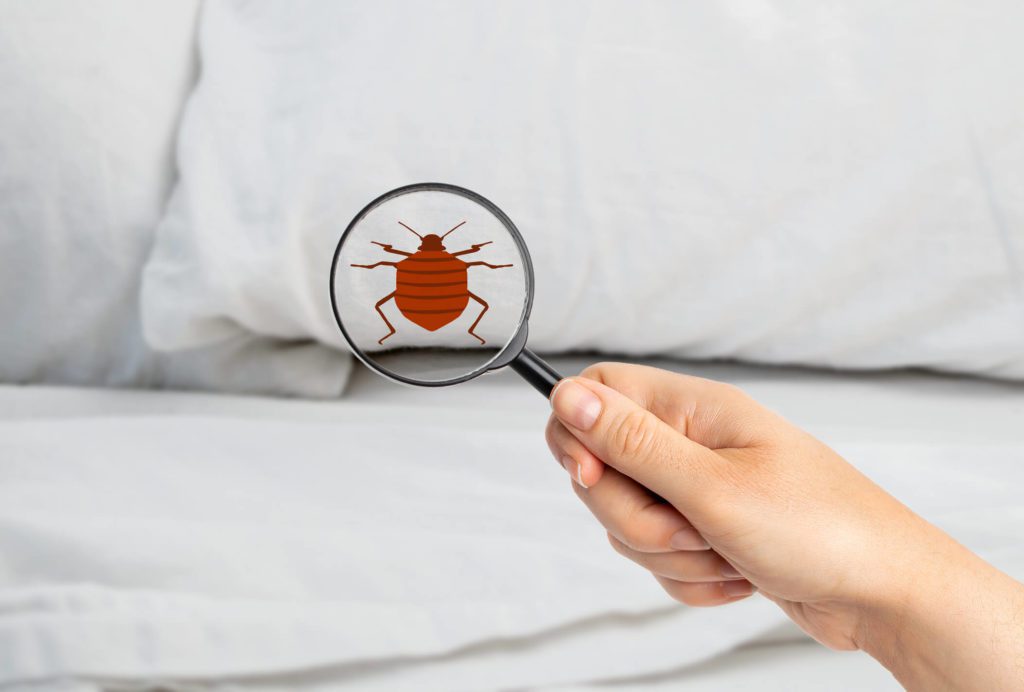King-size Bed Pest Pest Control Expert Cincinnati: Pro Bug Solutions
King-size Bed Pest Pest Control Expert Cincinnati: Pro Bug Solutions
Blog Article
A Break Down of the Different Kinds Of Insect Control Solutions
In the realm of bug control, a plethora of approaches exist to resolve and battle the visibility of undesirable animals. From the traditional use of chemical pesticides to much more innovative biological control solutions, each approach supplies distinctive benefits and restrictions. As we navigate through the diverse landscape of pest control remedies, recognizing the details of each approach ends up being vital in identifying the most effective training course of activity. Remain tuned as we explore the nuanced globe of parasite control methods and find just how each kind plays a distinct duty in safeguarding our settings.
Chemical Pesticides
Chemical pesticides are generally utilized in pest control to successfully eliminate a variety of bugs and various other insects. These chemicals work by targeting the anxious system of the parasites, disrupting their regular functions, and eventually bring about their demise. The usage of chemical pesticides has actually been a staple in the insect control sector for years because of their performance and quick results.

However, it is important to use chemical pesticides with care because of their potential harmful results on the atmosphere and non-target types. Improper application or overuse of these chemicals can cause pollution, injury to helpful bugs, and resistance development in bug populations. Therefore, it is critical to comply with safety standards and policies when using chemical pesticides for bug control.
Biological Control Approaches
Considering the potential environmental impacts and risks connected with chemical pesticides, organic control approaches provide an even more lasting approach to managing bug populaces. Organic control involves using all-natural enemies, such as predators, microorganisms, and bloodsuckers, to subdue bug populations. This method is commonly extra targeted, influencing just the specific pest species while reducing damage to useful bugs, people, and the atmosphere.

Once established, all-natural enemies can help regulate pest populations constantly without the demand for repeated applications of pesticides. Additionally, biological control is commonly more affordable and can assist minimize chemical resistance in pest populations over time.

Mechanical Bug Control
Mechanical parasite control includes the physical manipulation or removal of pests to handle their populations effectively. One usual example of mechanical parasite control is using catches to record rats or insects.
Another mechanical technique is the use of obstacles such as internet, screens, or fencings to block pests from getting in particular locations. By physically protecting against insects from accessing an area, the probability of infestations or damage can be significantly minimized. Additionally, hands-on approaches like handpicking insects off plants or frameworks can be efficient for smaller-scale problems.
While mechanical pest control techniques can be labor-intensive, they offer a non-chemical option that can be eco-friendly and sustainable. By targeting bugs straight, mechanical control techniques can assist maintain parasite populations in check without depending on chemicals.
All-natural Remedies
Utilizing natural solutions for parasite control offers a green and lasting technique to taking care of pest populations without resorting to chemical interventions. Natural treatments entail making use of materials derived from plants, minerals, or other naturally occurring sources to discourage or get rid of bugs. Planting certain herbs like basil, mint, or lavender around your residential or commercial property can ward off bugs due to their strong scents. Diatomaceous earth, a powder made from fossilized algae, can be used to combat parasites like ants, roaches, and bed pests by dehydrating their exoskeletons.
Additionally, essential oils such as tea tree oil or neem oil have insecticidal residential or commercial properties that can effectively regulate insects while being safe for the setting. One more natural treatment is introducing valuable bugs like ladybugs or praying mantises to your yard to take advantage of harmful parasites. By integrating these all-natural options into bug management approaches, individuals can lower their reliance on artificial chemicals and promote a much healthier, more well balanced ecosystem.
Integrated Bug Management
Integrated Bug Management (IPM) is a detailed approach that integrates various methods to effectively manage pest populaces while minimizing dangers to human wellness and the atmosphere. IPM entails the integration of several bug control methods such as biological control, environment adjustment, modification of cultural techniques, and the usage of resistant plant selections. By utilizing a combination of these strategies, IPM intends to reduce reliance on chemical pesticides, which can have adverse influence on communities and human health and wellness.
One trick facet of IPM is the emphasis on prevention. By carrying out actions to prevent insect invasions prior to they take place, such as maintaining proper cleanliness and securing entrance factors, the demand for responsive parasite control measures is reduced. Tracking and routine assessments play a critical duty in IPM, enabling early discovery of pest issues arrow pest control and prompt intervention.
Conclusion
In conclusion, the numerous types of parasite control options provide an array of choices for effectively taking care of insect infestations. Organic control methods use natural killers to control bugs. Integrated Insect Monitoring integrates a pest control numerous techniques for an all natural method to pest control.
Chemical chemicals are typically made use of in insect control to properly get rid of a vast variety of pests and other bugs.Mechanical pest control includes the physical adjustment or removal of bugs to handle their populations successfully (Kings pest control Cincinnati Ohio).Making use of all-natural remedies for bug control supplies a environmentally friendly and lasting method to handling parasite populations without resorting to chemical interventions.Integrated Insect Administration (IPM) is a thorough approach that combines different methods to successfully regulate pest populaces while minimizing risks to human health and the environment.In final thought, the different types of bug control options use an array of alternatives for properly taking linked here care of parasite problems
Report this page